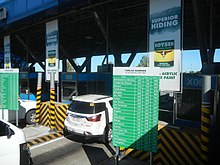Tollbooth


A tollbooth (or toll booth) is an enclosure placed along a toll road that is used for the purpose of collecting a toll from passing traffic. A structure consisting of several tollbooths placed next to each other is called a toll plaza, tollgate, or toll station. They have historically been staffed by transportation agents who manually collect the toll, but, in the modern day, many have been replaced with automatic electronic toll collection systems, such as E-ZPass in the Northeastern United States.
Replacement

In the 21st century, electronic toll collection (ETC) has replaced former locations of tollbooths around the world. ETC is an automated system that allows drivers to pay tolls without stopping. Benefits of automatic toll collection include reducing air pollution and fuel consumption, and saving motorists time and money compared to traditional tollbooths.[1][2]

The COVID-19 pandemic led to further losses of tollbooths, causing the U.S. state of Maryland to accelerate its shift towards all-electronic tolling by eliminating all cash payments from toll facilities.[2] Similarly, the Pennsylvania Turnpike accelerated its plan to move to all-electronic tolling. While tollbooths are currently still in place throughout the turnpike system, signs inform drivers to keep moving through toll plaza, "we bill you".[3]
See also
References
- ^ Zahedieh, Farnaz; Lee, Chris (2024). "Impacts of a Toll Information Sign and Toll Lane Configuration on Queue Length and Collision Risk at a Toll Plaza with a High Percentage of Heavy Vehicles". Vehicles. 6 (3): 1249. doi:10.3390/vehicles6030059. ProQuest 3110698339.
- ^ a b Lazo, Luz (August 12, 2020). "Another victim of the Coronavirus: Cash tolls". The Washington Post. Retrieved September 28, 2020.
- ^ Glaser, Susan (June 17, 2020). "Pennsylvania Turnpike goes cashless, will bill you". cleveland.com. Retrieved October 29, 2024.
